《阿马尔》新制:用传统打破假日惯例
2019-04-25司马勤KenSmith编译李正欣
文:司马勤(Ken Smith) 编译:李正欣
我应该曾经提及过一两次,但还是要再重申一次:对于那些我早已烂熟于心的乐曲,你必须给出绝好的理由,我才会愿意走进现场再次聆听。这些曲目包括甲壳虫乐队(the Beatles)的多首流行歌曲,贝多芬的至少六部交响曲,以及亨德尔的《弥赛亚》——因为刚刚过去的圣诞佳节。因为我是一个“戒断综合征”的合唱团歌手,这部清唱剧任何段落中随便找一句,我都可以立即接下去,把曲子唱完。我可能偶尔会从维多利亚时代的标准版本“漂移”至1742年都柏林的原版,但是大家朋友一场,一百年的差别又算什么?
无论如何幸运的是,每次听到柴可夫斯基《胡桃夹子》(Nutcracker)时我都不会冲动地想要翩翩起舞,但我还是万般不愿意去看这部芭蕾舞剧。前几天我只不过瞄到一眼捷杰耶夫指挥马林斯基的《胡桃夹子》录音封套,整首“糖果仙子之舞”(Sugar Plum Fairy)瞬间就充斥在我的耳中。故此,每逢圣诞元旦,为了避开那些“魔音绕耳”,我都推行“禁止《胡桃夹子》、禁止亨德尔”政策,尽量远离音乐厅以及舞蹈演出。
这样,我可以腾出更多时间看歌剧。你明白吗,歌剧剧目中没有《弥赛亚》。当然,《波希米亚人》的第一、二幕都发生在平安夜(但大多数人都不记得了),但如今《波希米亚人》在一年中其余的364晚在世界各地的剧院都会上演。大规模的歌剧院通常会在圣诞节轮流搬演《汉泽尔与格蕾泰尔》(Hansel and Gretel)与《魔笛》(The Magic Flute)——大都会歌剧院在2018年平安夜演出的是《魔笛》,而伦敦科文特花园皇家歌剧院选择在12月26日开演《汉泽尔与格蕾泰尔》。正如一名纽约乐评人讽刺的那样:“一年歌颂共济会,一年歌颂同类相食,推广圣诞的普世理念不偏不倚。”
事实上,这并不是说歌剧剧目中缺少节日主题——其实,恰恰相反。意大利是一个天主教国家,也是歌剧的诞生地,当然孕育了不少与宗教沾边的歌剧——尤其是在宗教节日期间(编者按:降临节与大斋期)不允许剧院演出世俗剧目的时代。查尔斯·狄更斯的《圣诞颂歌》(A Christmas Carol)被多次搬上歌剧舞台,起码有十个不同版本,包括意大利语版与德语版。到了21世纪,新世纪里也见证了不少“应景”作品:凯文·普特斯(Kevin Putz )赢得普利策奖的《平安夜》(Silent Night)、马克·阿达摩(Mark Adamo)的《圣诞老人成长记》(Becoming Santa Claus)、杰克·海格(Jake Heggie)的《生活多美好》(It's a Wonderful Life,又称《风云人物》)。这些歌剧大部分源自美国,差不多全都是没有宗教元素的世俗故事,很多是从电影改编而来。
但问题是,它们都不是独一无二的。我可以肯定地说,这些作品都达不到《弥赛亚》那样铺天盖地的影响力。偶尔会有些原创音乐会作品被搬上舞台——比如说,约翰·亚当斯(John Adams)具有拉丁美洲音乐风格的清唱剧《厄尔尼诺》(El Niño),去年12月在大都会博物馆修道院艺术馆演出。曾几何时,不同的导演热衷于把《弥赛亚》戏剧化,甚至有不少“重构”《弥赛亚》的音乐项目——从莫扎特的“重新”配器版,到本乐季在曼哈顿北部(华盛顿高地)上演的、拥有福音音乐风格的《亨德尔火了》(Too Hot to Handel)——但它们都是向原作致敬的作品,或者是专门反《弥赛亚》的创意。这只会让我们更希望于回归到原作本身。
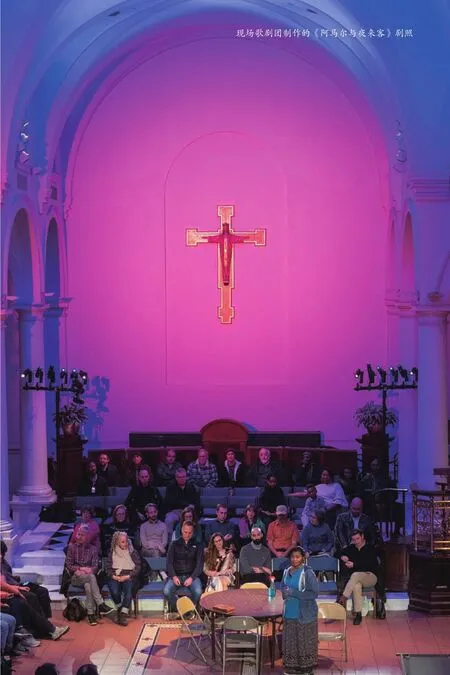
说真的,在歌剧世界里,我认为只有一部作品可以与《弥赛亚》相提并论——它保证令观者落泪。这个剧目不是天天会上演,而且每次在舞台上搬演的档期都不会太久,至今备受欢迎。朋友们,欢迎你们走进吉安·卡洛·梅诺蒂的《阿马尔与夜来客》(Amahl and the Night Visitors)的世界。
***
《阿马尔》描述了一个残疾小男孩阿马尔与东方三博士结识,一起追寻“圣婴”的故事。歌剧于1951年的平安夜在美国国家电视台(NBC)首播,它不单是首部特别为电视委约、为电视广播而创作的歌剧,更是美国电视历史里首次制作的圣诞特辑,开创了电视广播的新传统。最奇怪的是,这部作品让阿马尔、格林奇(Grinch)、小雪人(Frostythe Snowman)与红鼻子驯鹿鲁道夫(Rudolph the Red-Nosed Reindeer)成了“远房亲戚”。
但是,他们之间有一个关键的区别点:自《阿马尔》首播后的十多年里,每年都会有现场直播(1953年开始有了彩色制作版);此后,还录播重放了数年。1953年,该作品首次在英国电视上亮相;到了1957年,《阿马尔》登陆澳大利亚,12月中旬在墨尔本现场演出(兼录影),圣诞节当天在悉尼播放。
即便如此,梅诺蒂从未想过这部歌剧只能局限于电视上。首播后几个月,《阿马尔》就在布卢明顿的印第安纳大学的舞台上亮相。首播后不到一年,该剧也在波士顿的拉德克里夫学院搬演(这是一家女子学院,后来跟只招收男生的哈佛大学合并)。
梅诺蒂创作《阿马尔》的灵感源自挂在大都会博物馆那幅耶罗尼米斯·博斯(Hieronymus Bosch)的著名油画《三博士朝圣》(The Adoration of theMagi)。作曲家在首播前毫不掩饰地宣称《阿马尔》是一部“儿童歌剧”:“这部作品试图捕捉我自己的童年。在意大利,我们没有圣诞老人。送礼物给我们的是东方三博士。”
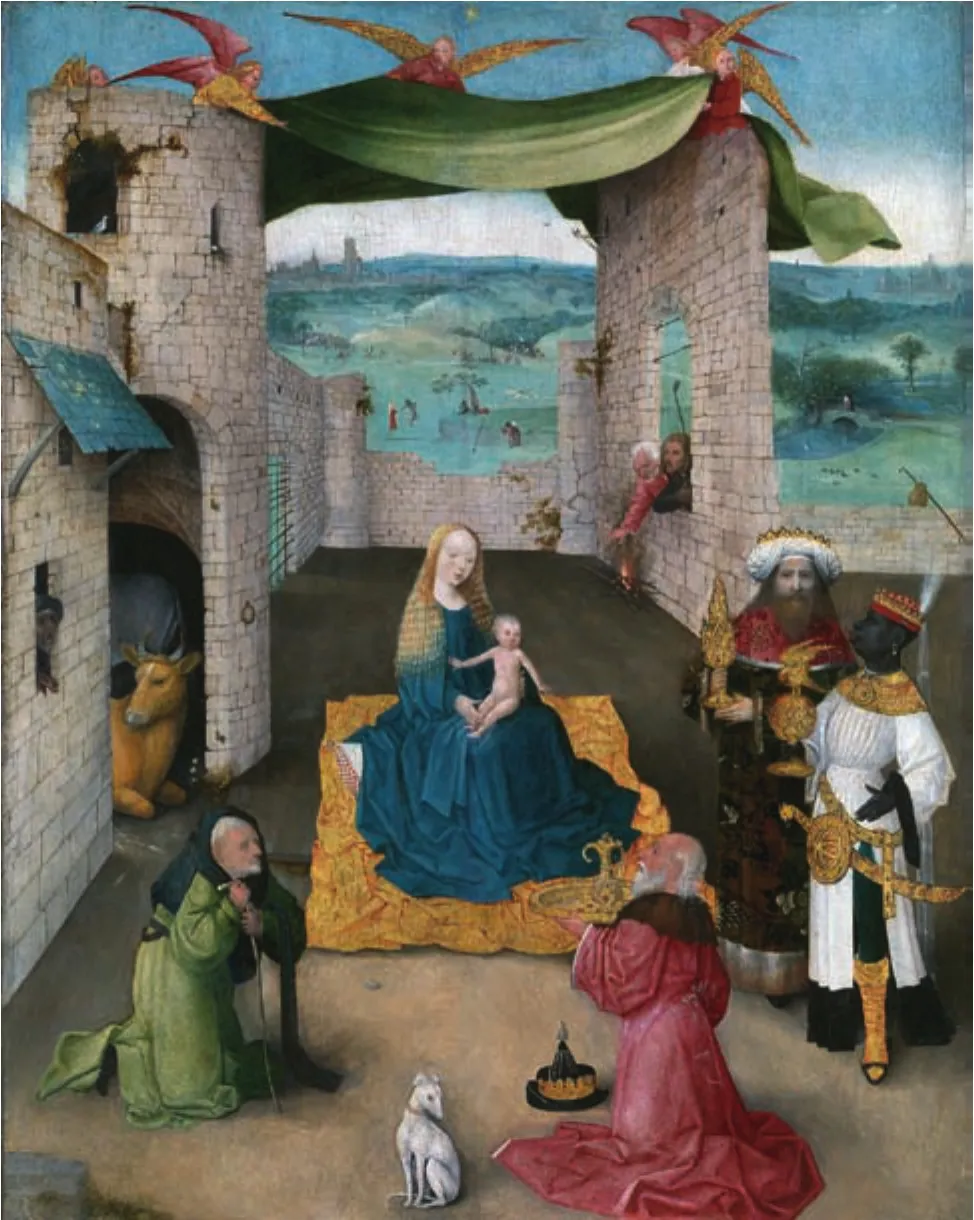
左页:大都会博物馆收藏的耶罗尼米斯·博斯的著名油画《三博士朝圣》
少年时代来到美国后,在节日里被圣诞老人围绕着——更不用说洛克菲勒中心的大圣诞树、第五大道的橱窗装饰了——梅诺蒂说他把家乡的传统忘得一干二净。接到美国国家电视台的委约后,梅诺蒂绞尽脑汁寻找灵感。有一天,他在大都会博物馆不经意间看到博斯的油画,童年的记忆立刻涌上来。
“当我看到这幅画的时候,突然之间,我仿佛听到远方青蓝山脉传来三博士的歌声,”他回忆道,“我顿时明白了,这是他们送给我的礼物。”
虽然《阿马尔》的制作有大有小,各种演出场所的版本都有,但作曲家在挑选男主角方面限定了严格的条件。钢琴谱上的制作附注中写明,阿马尔必须要由小男孩扮演:“这部歌剧,无论音乐上或戏剧概念上,都不容许女性演员反串男孩子。”
***
终于可以切入正题了:上个月我在纽约看过一场《阿马尔》的演出。至今,我已经看过不少这部歌剧的制作版本:从大学礼堂到教堂地库,从学生演员到歌剧大明星,不同的演出水平与歌唱艺术。可是,此次由现场歌剧团(On Site Opera)策划、在曼哈顿圣使徒教堂流动厨房(Holy Apostles Soup Kitchen)搬演的《阿马尔》却令我惊叹不已。
正如其名,现场歌剧团故意避开任何传统的场所举办演出。歌剧团曾经在1920年代主题风格的夜总会里搬演格什温的《蓝色星期一》(Blue Monday),在杜莎夫人蜡像馆制作拉莫的《皮格马利翁》(Pigmalion),在一个小区公用的花园里演出莫扎特的《假扮园丁的姑娘》(Secret Gardener)。几年前,我观赏过现场歌剧团制作的米约(Milhaud)的《有罪的母亲》(The Guilty Mother,根据博马舍《费加罗的婚礼》三部曲的最后一部分为基础创作而成)的美国首演,地点是一家名为“车库”的可变空间(该场所有时候会成为一间豪华的陈列室)。
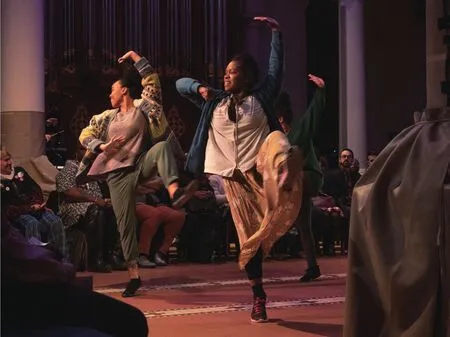
上:现场歌剧团制作的《阿马尔与夜来客》剧照
相比之前看过的这些作品,《阿马尔》属于标准歌剧剧目,只不过现场歌剧团的演出一点都不“标准”。心跳歌剧团(Heartbeat Opera)最近把《菲岱里奥》(Fidelio)的核心——关于政治犯的故事——挖了出来,更新了故事背景以影射美国当代社会;而现场歌剧团的导演埃里克·爱因霍恩(Eric Einhorn)同样把古老的故事(发生于两千年前的圣经故事)更新为现代都市的一则寓言。
爱因霍恩的制作似乎在发问,圣诞故事不就是在讲述一个露宿家庭在最需要帮助的时刻得到援助的情节吗?梅诺蒂更增添了一层艺术性,把焦点从“圣婴”转向比他更不幸的、住在邻近的小男孩。从外围的环境开始,将情节娓娓道来,表达的信息更加清晰明确。
爱因霍恩对于歌剧里的角色关系,用了传统的处理手法,比如说阿马尔[由德文·扎米尔·科尔曼(Devin Zamir Coleman)饰演]与常年受苦的母亲[由女高音安迪·玛丽·摩尔(Aundi Marie Moore)饰演]。导演没有强调母亲的守财奴心态,仅突显她表面上那种安静的绝望。科尔曼的音量比较轻,无法响透整个教堂,但他的音准无懈可击,咬字相当清楚,演出富有感染力。
可是,爱因霍恩所构思的东方三博士与其他制作的相比就属于另类了。三位博士推着超市购物车走进教堂,车上装着他们所有的财产。在很多人眼中,他们更像是街头露宿者。观众们在进场前,尤其是等他们看罢演出后,都有可能在圣使徒教堂附近碰到类似装扮的露宿者。在这里,“东方博士”致力找寻圣婴,他们究竟是智者还是狂人?无论是导演或者三位配搭得天衣无缝的演员——丹尼尔·贝尔彻(Daniel Belcher)饰演的梅尔奇奥(Melchior)、约瑟夫·盖恩斯(Joseph Gaines)饰演的卡斯帕(Kaspar)和穆萨·恩古瓦纳(Musa Ngqungwana)饰演的巴尔萨扎(Balthazar),都放任观众们依据自己的所见所闻,得出自己的结论。
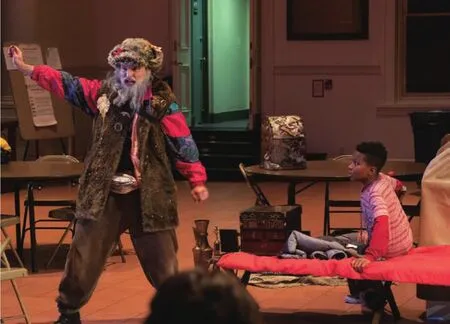
上、右页:现场歌剧团制作的《阿马尔与夜来客》剧照
让我们返回“外围”这个概念,也是此次演出“用力最猛”的部分。就像心跳歌剧团的《菲岱里奥》里用上真正的囚犯演出“囚犯大合唱”,现场歌剧团的“露宿者”版本《阿马尔》请来了“露宿者”合唱团。参与演出的团员都是动土机构(Breaking Ground)现在或以往的受益者,该组织是一个为露宿者提供永久性的支持性住房的慈善团体。
诚然,所有这一切都与梅诺蒂的原始观念不谋而合。即使是在演出期间,我心里一直抱有着怀疑:这部单薄的独幕歌剧——时长限制于一小时的电视播放,还包括广告时段——可以承担这么沉重的导演手法吗?然而,无论是梅诺蒂的故事还是音乐[由杰弗里·麦克唐纳(Geoffrey McDonald)指挥的室内管弦乐队]都没有露出任何有压力的迹象。
要是梅诺蒂观赏这个制作,他会开心吗?当年他细读合约,在法律允许的范围内,第一时间取消了国家电视台的原始录像,理由仅仅是因为他没有参与拍摄。显然,作曲家有一个很大的顾虑——这次虽然现场歌剧团把很多细节都修改了,但至少他们找到了小男孩这个角色的合适人选。
I've said this once or twice before, but it bears repeating: Any music I can hear from start to finish in my head needs a good reason for me to hear it live.That includes most songs by the Beatles, at least six of Beethoven's symphonies and, since we're in the holiday season, Handel'sMessiah. As a recovering choral singer, I can pretty much start it rolling at any point. I may occasionally drift from the standard Victorian edition to the original 1742 Dublin version,but hey, what's a hundred years among friends.
Fortunately for the world, I don't get the urge to dance to Tchaikovsky'sNutcracker, but the sentiment is pretty much the same. I barely glanced at Valery Gergiev's Mariinsky recording the other day and I can still hear the Sugar Plum Fairy. So with a no-Nutcracker, Handel-free holiday policy, I usually avoid concert halls and dance performances like the plague.
Which leaves more time for opera. You see, operadoesn't have aMessiah. Sure,La Bohèmetakes place on Christmas Eve (which most people forget) butBohèmeis usually playing somewhere the other 364 nights as well. Big houses often alternate betweenHansel and Gretelone year andThe Magic Flutethe next—this season the Met presented itsMagic Fluteon Christmas Eve, the Royal Opera House started its run ofHansel and Gretelon Boxing Day—thus, as one New York critic put it, “equitably celebrating the Yuletide values of Freemasonry and cannibalism.”
Not that the opera repertory lacks for holiday themes—much the opposite, in fact. Italy, being a Catholic country as well as the birthplace of opera,has its fair share—particularly from eras when secular theatre was prohibited during holy festivals.Charles Dickens'sA Christmas Carolhas been set at least 10 times for the opera stage, including versions in Italian and German. The 21stcentury has seen a bumper crop of “holiday” operas, from Kevin Putz's Pulitzer Prize-winningSilent Nightto Mark Adamo'sBecoming Santa Clausto Jake Heggie'sIt's a Wonderful Life. Most have originated in the US, nearly all are secular, and a disproportionate number are adapted from holiday films.
But here's the thing: there's not just one. And it's safe to say, none of them will ever reachMessiah-level saturation. A couple of concert pieces occasionally get staged productions, like John Adams's Latin-tinged oratorioEl Niño, which was revived in December at the Metropolitan Museum of Art's Cloisters. There have even been a couple of stagings of Handel'sMessiah—not to mention various musical reimaginings of the work, from Mozart's intriguing reorchestration to the gospel-infusedToo Hot to Handel, which also appeared this season in Washington Heights. But these are either tributes, or anti-Messiahs, which only gets us back where we started.
Really, the opera world has only one serious contender—a piece almost guaranteed to pull the heartstrings, and one that comes around occasionally but rarely outstays its welcome. My friends, meet Gian Carlo Menotti'sAmahl and the Night Visitors.
***
Amahl, about a disabled boy who befriends the Magi on their search for the “wondrous Child,” saw its premiere on America's NBC television network on Christmas Eve in 1951. Not only was it the first opera ever commissioned and written expressly for television, it was also the first network television special to become a holiday tradition. Which,strangely enough, makes the Grinch, Frosty the Snowman and Rudolph the Red-Nosed Reindeer sort of distant cousins.
But there was a key difference: For more than a decade, performances ofAmahlwere broadcast live(and by 1953, in color). After that, it was videotaped and replayed for a few more years. By 1953, the operahad its first television appearance in England, and by 1957 had made its way to Australia, performed live in mid-December in Melbourne and rebroadcast in Sydney on Christmas Day.
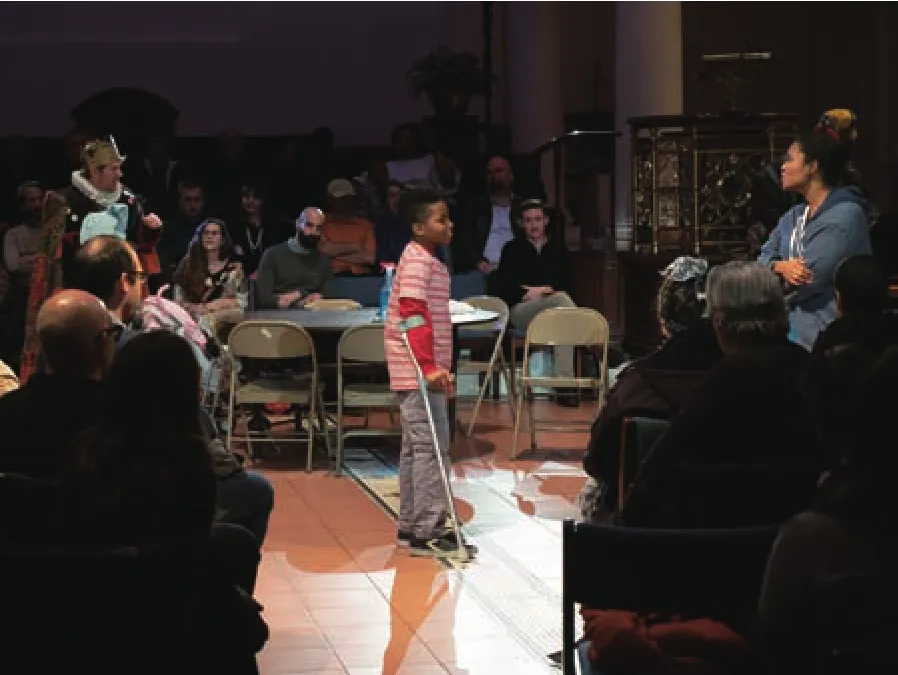
Even so, Menotti never thought of the opera as being confined to television, and only a few months after its premiereAmahlhad its first stage appearance at Indiana University in Bloomington. By the end of its first year, the opera had made it to Boston in a production by Radcliff College, the female educational institution affiliated with the (then) all-male Harvard.
Menotti, whose initial inspiration was Hieronymus Bosch's paintingThe Adoration of the Magi(hanging in New York's Metropolitan Museum of Art), unapologetically introducedAmahlas a “children's opera” right before its premiere telecast. “It tries to capture my own childhood,”he explained, “because in Italy we have no Santa Claus.Our gifts were brought to us by the Three Kings instead.”
After coming to America and being surrounded by Santa—not to mention the Rockefeller Center Christmas tree and the window displays on Fifth Avenue— Menotti said he'd forgotten all the traditions of his country. Then, having received the commission from NBC, he was struggling for inspiration when,strolling through the Met Museum, he encountered Bosch's painting and his childhood memories returned in a rush.
“As I was looking at it, suddenly I heard again,coming from the distant blue hills, the weird song of the Three Kings,” he recalled. “I then realized they had brought me a gift.”
Although productions ofAmahlhave come in all shapes and sizes, Amahl himself was fairly restricted by the composer. In his piano-vocal score, Menotti's production note indicates that the role should always be played by a boy: “Neither the musical nor the dramatic concept of the opera permits the substitution of a woman costumed as a child. “
***
Which finally brings me around to the show I saw last month in New York. By now, I've seenAmahldone in college auditoriums and church basements, by students and opera professionals and every measure of vocal artistry in-between. But nothing quite prepared me for On Site Opera's production at the Holy Apostles Soup Kitchen in Manhattan.
True to its name, On Site Opera shuns traditional venues. They've staged Gershwin'sBlue Mondayin a 1920s-themed nightclub, Rameau'sPigmalionat Madame Tussaud's and Mozart'sSecret Gardenerin,yes, a community garden. The last On Site show I saw was the US premiere of Milhaud'sLa mere coupable(based on the last play of Beaumarchais' Figaro trilogy) in a luxury showroom and event space called The Garage.
By comparison,Amahlis standard repertory, though very little was “standard” with On Site's production.Much like Heartbeat Opera's recentFidelio, which took the core of Beethoven's opera—a show about political prisoners—and updated it to reflect similar themes in the US today, On Site's director Eric Einhorn took the essence of the 2000-year-old Biblical narrative and spun it in a modern, urban setting.
What is the Christmas story, Einhorn's production asks, but a homeless family receiving abundant care in their time of need? Menotti had added another layerof artistry, focusing not on the “wondrous Child” but rather the less auspicious boy down the street. From the periphery, that message rings even more clearly.
Much of the show fell into fairly traditional focus,such as the relationship between the mischievous Amahl (sung by the young Devin Zamir Coleman) and his longsuffering mother (soprano Aundi Marie Moore).Rather than sliding into Scrooge territory, Moore's quiet desperation drew a measure of sympathy.Coleman's voice was a bit light for the space, but his pitch was spot-on, his articulation more than reasonably audible and his charm infectious.
Where Einhorn departed most overtly from other productions is with the Three Kings, who roll their shopping carts into the church carrying all their possessions. The “Kings”—to most eyes, anyway—are hardly distinguishable from the street people that audience members encountered on their way to the venue (and no doubt, on their way home). Here, their“royal” quest is either inspired or demented, and neither Einhorn nor his superbly balanced trio—Daniel Belcher's Melchior, Joseph Gaines's Kaspar or Musa Ngqungwana's Balthazar—helps the audience decide which.
But back to the “periphery,” which is where the show aims its heaviest artillery. Much in the spirit of Heartbeat'sFidelio, which presented that show's“Prisoners' Chorus” using actual prisoners, On Site's “homeless” production ofAmahlrecruited a ”homeless” chorus from current and former beneficiaries of an organization named Breaking Ground, a provider of permanent supportive housing to those in need.
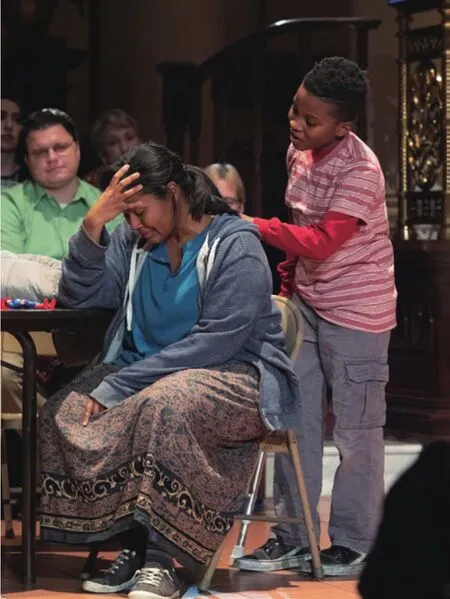
现场歌剧团制作的《阿马尔与夜来客》剧照
All of this, admittedly, plays fast and loose with Menotti's original concept. Even during the show, I questioned whether the shoulders of this slender one-act—commissioned for an hour-long broadcast,including commercials—could ultimately support such heavy directorial hands. And yet, neither the story nor the score (with chamber orchestra conducted by Geoffrey McDonald) showed the least signs of strain.
Would Menotti have been happy? He did, after all,cancel NBC's original video recording as soon as he legally could, simply because he hadn't been involved in the shoot. But apparently, the composer had one major concern—and for all its tinkering, On Site Opera at least found the right boy for the role.
